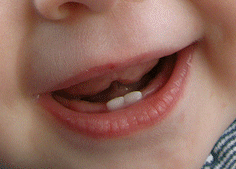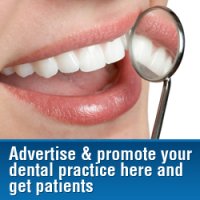
What is Baby Bottle Tooth Decay
Baby bottle tooth decay also known as baby bottle syndrome is the only severe dental disease common in children under 3yrs.
Baby bottle tooth decay is a form of severe early childhood caries, associated with frequent or prolonged consumption of liquids containing fermentable carbohydrates.
Baby Bottle Tooth Decay
Baby bottle syndrome (also called nursing bottle tooth decay) is common in kids who use to fall asleep with a bottle of sweetened liquid in the mouth or nurse continuously from their mother's breast. Preventing baby bottle tooth decay must be a top priority for parents concerned about their child's health.
Early childhood caries can be a particularly virulent and destructive form of dental caries, beginning soon after teeth eruption, developing on smooth teeth surfaces, progressing rapidly and having a lasting detrimental impact on the dentition.
The upper teeth are those usually most affected and especially the two front teeth.
Children experiencing dental caries as infants or toddlers have a much greater probability of subsequent caries in both the primary and permanent dentitions. Some younger children with baby bottle tooth decay problems may be severely underweight because of the associated pain and their disinclination to eat.
Causes & Symptoms of Baby Bottle Tooth Decay
When the first teeth erupt, their surface is not hardened enough and they are more susceptible to the early childhood caries.
Infants are in high risk to suffer from baby bottle tooth decay when sweetened liquids are given to them for long periods and especially before or during sleep time. Bacteria use the sugar as food, producing acids that affect the teeth if they remain in the acid environment for a long time, causing tooth decay. When the baby is asleep, the saliva production is reduced increasing the danger of baby bottle tooth decay.
The early childhood caries first appear at the gum line as subtle, white, decalcified streaks. Later, brown spots appear along the gumline. Without proper treatment the crowns of the teeth could get completely destroyed. In case of baby bottle tooth decay, immediate intervention is necessary to prevent further dental destruction as well as more widespread health problems.
The early loss of primary teeth due to tooth decay can cause serious problems to the development of the permanent teeth that already grow underneath them.
Because children with early childhood caries are at greater risk for subsequent caries development, aggressive preventive and therapeutic measures are often necessary, including dental fillings, teeth fluoridation and dental sealants.
How to prevent Baby Bottle Tooth Decay
The following advice can help tour baby to avoid baby bottle tooth decay :
- Night-time breast-feeding should be avoided after the first baby teeth begin to erupt.
- Give the bottle to the baby only during feeding. Don't leave the bottle to the child during sleep.
- Don't fill the baby's bottle with sugar water, juice or soft drinks.
- Encourage children to drink from a cup as they approach their first birthday. Use a cup if you want to offer sugar containing drinks to a baby.
- Don't use the bottle as a pacifier or at least fill it only with water. Never use pacifiers dipped in sweet liquids.
- After each feeding wipe the baby's gums with a clean damp wash cloth. For preventing baby bottle tooth decay, start brushing the baby's teeth after the first year to remove dental plaque.
Read more about cleaning and brushing baby teeth. - Babies and toddlers are most often infected with the oral bacteria that cause the early childhood caries by their parents. Parents should never put the baby's pacifiers or bottle nipples in their own mouth.
- Regular visits to a pediatric dentist after the first birthday are necessary for preventing baby bottle tooth decay and other dental problems. After the first tooth erupts around the first birthday you should schedule the child's first visit to the dentist.


